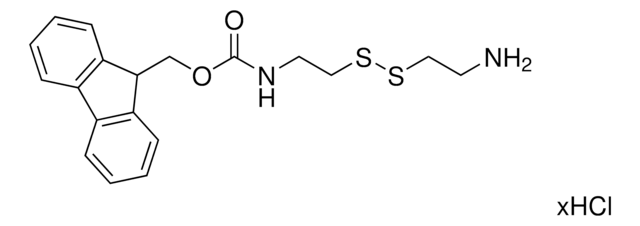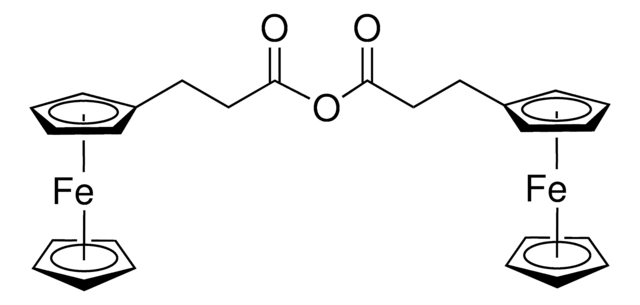23184
Fmoc-Chlorid
BioReagent, ≥99.0% (HPLC)
Synonym(e):
9-Fluorenylmethoxycarbonylchlorid, 9-Fluorenylmethylchloroformin, Fmoc-Cl
About This Item
Empfohlene Produkte
Produktlinie
BioReagent
Assay
≥99.0% (HPLC)
Form
solid
mp (Schmelzpunkt)
61-64 °C
62-64 °C (lit.)
Funktionelle Gruppe
Fmoc
Lagertemp.
2-8°C
SMILES String
ClC(=O)OCC1c2ccccc2-c3ccccc13
InChI
1S/C15H11ClO2/c16-15(17)18-9-14-12-7-3-1-5-10(12)11-6-2-4-8-13(11)14/h1-8,14H,9H2
InChIKey
IRXSLJNXXZKURP-UHFFFAOYSA-N
Suchen Sie nach ähnlichen Produkten? Aufrufen Leitfaden zum Produktvergleich
Verwandte Kategorien
Anwendung
Sonstige Hinweise
Signalwort
Danger
H-Sätze
Gefahreneinstufungen
Eye Dam. 1 - Skin Corr. 1B
Zusätzliche Gefahrenhinweise
Lagerklassenschlüssel
8A - Combustible corrosive hazardous materials
WGK
WGK 3
Flammpunkt (°F)
Not applicable
Flammpunkt (°C)
Not applicable
Persönliche Schutzausrüstung
Eyeshields, Faceshields, Gloves, type P3 (EN 143) respirator cartridges
Analysenzertifikate (COA)
Suchen Sie nach Analysenzertifikate (COA), indem Sie die Lot-/Chargennummer des Produkts eingeben. Lot- und Chargennummern sind auf dem Produktetikett hinter den Wörtern ‘Lot’ oder ‘Batch’ (Lot oder Charge) zu finden.
Besitzen Sie dieses Produkt bereits?
In der Dokumentenbibliothek finden Sie die Dokumentation zu den Produkten, die Sie kürzlich erworben haben.
Kunden haben sich ebenfalls angesehen
Unser Team von Wissenschaftlern verfügt über Erfahrung in allen Forschungsbereichen einschließlich Life Science, Materialwissenschaften, chemischer Synthese, Chromatographie, Analytik und vielen mehr..
Setzen Sie sich mit dem technischen Dienst in Verbindung.










